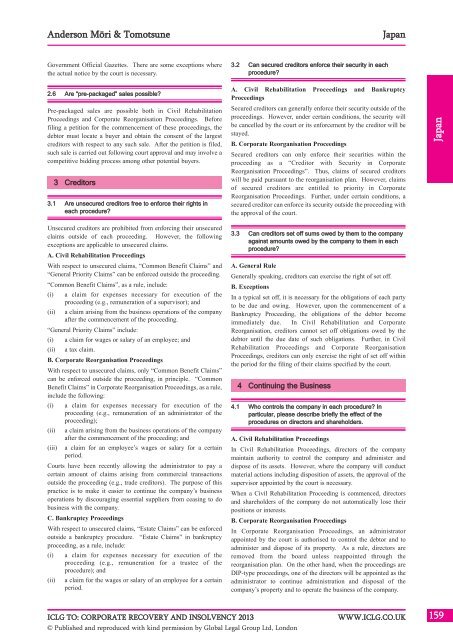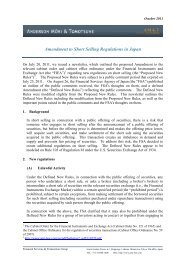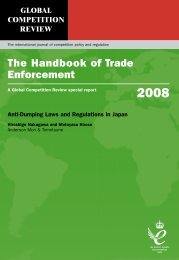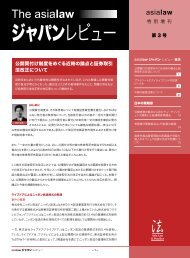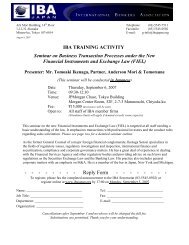Anderson Mōri & TomotsuneJapanJapanD. Avoidance of PerfectionPerfection can be avoided if the act of perfection:(i) occurs after the company suspends payments or a petition forCivil Rehabilitation Proceedings, <strong>Corporate</strong> ReorganisationProceedings or Bankruptcy Proceedings is filed;(ii) is taken after 15 days from creation, transfer or change ofcreditors’ rights; <strong>and</strong>(iii) is taken with knowledge of the company’s suspension ofpayments to creditors or the filing of a petition for CivilRehabilitation Proceedings, <strong>Corporate</strong> ReorganisationProceedings or Bankruptcy Proceedings.1.3 What are the liabilities of directors (in particular civil,criminal or disqualification) for continuing to trade whilst acompany is in financial difficulties in Japan?C. Bankruptcy ProceedingsBankruptcy Proceedings are liquidation proceedings administeredby a court-appointed trustee. Secured creditors are not subject tothe proceeding <strong>and</strong> are free to enforce their collateral. Thecompany is liquidated <strong>and</strong> there may be a distribution at the end ofthe proceeding to creditors.2.2 What are the tests for insolvency in Japan?The test is whether the total liabilities of the company exceed thetotal assets of the company. If so, then the company is regarded as“insolvent” under the Company Act. However, as described below,the grounds for commencing insolvency proceedings are notnecessarily triggered by insolvency alone.There are no specific statutes imposing civil or criminal liability ondirectors under the circumstances described above. However, if adirector of the company knows, or reasonably should know, thatpayment for an obligation will not be made at the time of thetransaction, then such director may be liable for damages incurredby the counterparty to the transaction.2 Formal Procedures2.1 What are the main types of formal procedures availablefor companies in financial difficulties in Japan?A. Civil Rehabilitation ProceedingsCivil Rehabilitation Proceedings are debtor-in-possession (“DIP”)proceedings, where the incumbent management remains in place<strong>and</strong> proposes a rehabilitation plan to creditors. DIP proceedings aresubject to the supervision of a supervisor appointed by the court.The DIP’s rehabilitation plan must be approved by the creditors.Secured creditors are excluded from the proceedings <strong>and</strong> are free toenforce their collateral.B. <strong>Corporate</strong> Reorganisation Proceedings<strong>Corporate</strong> Reorganisation Proceedings are the most powerfulinsolvency proceedings, whereby all secured creditors <strong>and</strong>unsecured creditors are subject to the proceeding. After the petitionfor commencement, the court issues: (i) an Administration Order,which divests the authority of the incumbent management <strong>and</strong>appoints an Interim Administrator; <strong>and</strong> (ii) a Protection Order,which prohibits the company from paying any debt (with certainexceptions). The court may also issue a Comprehensive ProtectionOrder prohibiting any secured creditor from enforcing its rights incollateral. After the Interim Administrator’s review <strong>and</strong>investigation, the court may appoint an administrator who has fullresponsibility to manage the company <strong>and</strong> create a reorganisationplan, which is subject to approval of the creditors <strong>and</strong> the court.Recently, the Tokyo District Court started DIP-type <strong>Corporate</strong>Reorganisation Proceedings, where the court does not issue anAdministration Order <strong>and</strong> the incumbent management remains inpower. In such proceedings, the court issues (i) a Protection Orderprohibiting the company from paying any debt (with certainexceptions), <strong>and</strong> (ii) a Supervision <strong>and</strong> Investigation Order,pursuant to which the court appoints a Supervisor/Investigator tocarry out an initial review of whether the DIP proceeding isappropriate for the case. After the Supervisor/Investigator’s review,in typical cases one of the company’s directors is appointed asadministrator to carry out the business of the company.2.3 On what grounds can the company be placed into eachprocedure?A. Bankruptcy ProceedingsIf a company is generally <strong>and</strong> continuously unable to pay its debtswhen due, Bankruptcy Proceedings may be commenced. As amatter of law, a company is presumed to be generally <strong>and</strong>continuously unable to pay its debts if (i) the company fails to paya promissory note or important debt such as the principal of acorporate bond or bank loans, or other obligations in general, or (ii)the company is “insolvent”.B. Civil Rehabilitation Proceedings <strong>and</strong> <strong>Corporate</strong>Reorganisation ProceedingsA company may file a petition to commence the proceedings if (i)there is a possibility that the grounds for commencing BankruptcyProceedings may occur, or (ii) the company is unable to pay itsobligations without creating a significant burden for continuing itsbusiness.2.4 Please describe briefly how the company is placed intoeach procedure.Voluntary PetitionA voluntary petition is generally commenced by evaluating thefinancial status of the company <strong>and</strong> the selection of the appropriateproceedings with the assistance of attorneys <strong>and</strong> accountants. Theboard then adopts a resolution to file a petition for one of theproceedings.Involuntary PetitionThe proceedings may also be commenced by an involuntarypetition, although such practice is uncommon. Under <strong>Corporate</strong>Reorganisation Proceedings, only creditors who have claims inexcess of a minimum threshold are entitled to file involuntarypetitions. Requirements for commencing involuntary cases includethe petitioner’s proof that the company has grounds for thecommencement of the proceedings, which are the same as those forcommencing voluntary Bankruptcy Proceedings.2.5 What notifications, meetings <strong>and</strong> publications are requiredafter the company has been placed into each procedure?With respect to Civil Rehabilitation Proceedings, <strong>Corporate</strong>Reorganisation Proceedings or Bankruptcy Proceedings, no actualnotice to creditors is required with respect to commencement of thecase, the filing deadline for a proof of claim (bar date), etc. Instead,the law provides that any notice shall be publicly posted in158WWW.ICLG.CO.UK© Published <strong>and</strong> reproduced with kind permission by Global Legal Group Ltd, LondonICLG TO: CORPORATE RECOVERY AND INSOLVENCY <strong>2013</strong>
Anderson Mōri & TomotsuneJapanGovernment Official Gazettes. There are some exceptions wherethe actual notice by the court is necessary.3.2 Can secured creditors enforce their security in eachprocedure?2.6 Are “pre-packaged” sales possible?Pre-packaged sales are possible both in Civil RehabilitationProceedings <strong>and</strong> <strong>Corporate</strong> Reorganisation Proceedings. Beforefiling a petition for the commencement of these proceedings, thedebtor must locate a buyer <strong>and</strong> obtain the consent of the largestcreditors with respect to any such sale. After the petition is filed,such sale is carried out following court approval <strong>and</strong> may involve acompetitive bidding process among other potential buyers.3 Creditors3.1 Are unsecured creditors free to enforce their rights ineach procedure?A. Civil Rehabilitation Proceedings <strong>and</strong> BankruptcyProceedingsSecured creditors can generally enforce their security outside of theproceedings. However, under certain conditions, the security willbe cancelled by the court or its enforcement by the creditor will bestayed.B. <strong>Corporate</strong> Reorganisation ProceedingsSecured creditors can only enforce their securities within theproceeding as a “Creditor with Security in <strong>Corporate</strong>Reorganisation Proceedings”. Thus, claims of secured creditorswill be paid pursuant to the reorganisation plan. However, claimsof secured creditors are entitled to priority in <strong>Corporate</strong>Reorganisation Proceedings. Further, under certain conditions, asecured creditor can enforce its security outside the proceeding withthe approval of the court.JapanUnsecured creditors are prohibited from enforcing their unsecuredclaims outside of each proceeding. However, the followingexceptions are applicable to unsecured claims.A. Civil Rehabilitation ProceedingsWith respect to unsecured claims, “Common Benefit Claims” <strong>and</strong>“General Priority Claims” can be enforced outside the proceeding.“Common Benefit Claims”, as a rule, include:(i) a claim for expenses necessary for execution of theproceeding (e.g., remuneration of a supervisor); <strong>and</strong>(ii) a claim arising from the business operations of the companyafter the commencement of the proceeding.“General Priority Claims” include:(i) a claim for wages or salary of an employee; <strong>and</strong>(ii) a tax claim.B. <strong>Corporate</strong> Reorganisation ProceedingsWith respect to unsecured claims, only “Common Benefit Claims”can be enforced outside the proceeding, in principle. “CommonBenefit Claims” in <strong>Corporate</strong> Reorganisation Proceedings, as a rule,include the following:(i) a claim for expenses necessary for execution of theproceeding (e.g., remuneration of an administrator of theproceeding);(ii) a claim arising from the business operations of the companyafter the commencement of the proceeding; <strong>and</strong>(iii) a claim for an employee’s wages or salary for a certainperiod.Courts have been recently allowing the administrator to pay acertain amount of claims arising from commercial transactionsoutside the proceeding (e.g., trade creditors). The purpose of thispractice is to make it easier to continue the company’s businessoperations by discouraging essential suppliers from ceasing to dobusiness with the company.C. Bankruptcy ProceedingsWith respect to unsecured claims, “Estate Claims” can be enforcedoutside a bankruptcy procedure. “Estate Claims” in bankruptcyproceeding, as a rule, include:(i) a claim for expenses necessary for execution of theproceeding (e.g., remuneration for a trustee of theprocedure); <strong>and</strong>(ii) a claim for the wages or salary of an employee for a certainperiod.3.3 Can creditors set off sums owed by them to the companyagainst amounts owed by the company to them in eachprocedure?A. General RuleGenerally speaking, creditors can exercise the right of set off.B. ExceptionsIn a typical set off, it is necessary for the obligations of each partyto be due <strong>and</strong> owing. However, upon the commencement of aBankruptcy Proceeding, the obligations of the debtor becomeimmediately due. In Civil Rehabilitation <strong>and</strong> <strong>Corporate</strong>Reorganisation, creditors cannot set off obligations owed by thedebtor until the due date of such obligations. Further, in CivilRehabilitation Proceedings <strong>and</strong> <strong>Corporate</strong> ReorganisationProceedings, creditors can only exercise the right of set off withinthe period for the filing of their claims specified by the court.4 Continuing the Business4.1 Who controls the company in each procedure? Inparticular, please describe briefly the effect of theprocedures on directors <strong>and</strong> shareholders.A. Civil Rehabilitation ProceedingsIn Civil Rehabilitation Proceedings, directors of the companymaintain authority to control the company <strong>and</strong> administer <strong>and</strong>dispose of its assets. However, where the company will conductmaterial actions including disposition of assets, the approval of thesupervisor appointed by the court is necessary.When a Civil Rehabilitation Proceeding is commenced, directors<strong>and</strong> shareholders of the company do not automatically lose theirpositions or interests.B. <strong>Corporate</strong> Reorganisation ProceedingsIn <strong>Corporate</strong> Reorganisation Proceedings, an administratorappointed by the court is authorised to control the debtor <strong>and</strong> toadminister <strong>and</strong> dispose of its property. As a rule, directors areremoved from the board unless reappointed through thereorganisation plan. On the other h<strong>and</strong>, when the proceedings areDIP-type proceedings, one of the directors will be appointed as theadministrator to continue administration <strong>and</strong> disposal of thecompany’s property <strong>and</strong> to operate the business of the company.ICLG TO: CORPORATE RECOVERY AND INSOLVENCY <strong>2013</strong>© Published <strong>and</strong> reproduced with kind permission by Global Legal Group Ltd, LondonWWW.ICLG.CO.UK159


